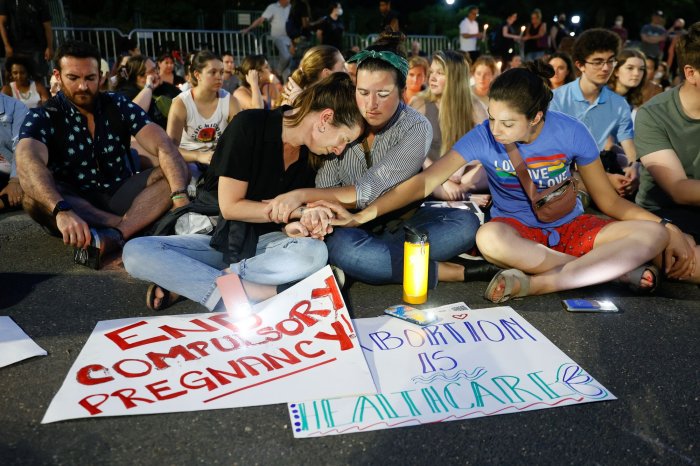Women attend a candlelight vigil in Washington on June 26, two days after the U.S. Supreme Court overturned Roe vs. Wade, ending federal abortion protections. Photo by Jemal Countess/UPI |
License Photo
Aug. 18 (UPI) -- A U.S. district judge in North Carolina has lifted an injunction that has been blocking the state's pre-viability abortion ban for years, allowing the reinstatement of its rule that prohibits the medical procedure after the 20th week of pregnancy.
The ruling was made Wednesday by Judge William Osteen who said the injunction was no longer legal as it was put in place on the foundation of Roe vs. Wade, which was overturned in late June.
"Neither this court, nor the public, nor counsel, nor providers have the right to ignore the rule of law as determined by the Supreme Court," he wrote in his opinion Wednesday.
The decision comes in a case first filed by abortion providers against the state in 2016 when North Carolina's then-Republican government enacted a law making it illegal to obtain an abortion after 20 weeks into a pregnancy.
Osteen placed the injunction against the ban in 2019, declaring the law unconstitutional due to the landmark 1973 Supreme Court ruling that provided abortion with federal protections.
But issue with his injunction arose earlier this summer after the high court overturned its precedent-setting decision, and the court issued an order inviting parities to the original case to file briefs on the matter in light this development as there may now be conflict between the 2019 injunction and the law.
While the state's current Democratic government said it would not take action to reinstate the law, Republican legislators asked the court to lift the injunction.
In his decision Wednesday, Osteen said that with Roe vs. Wade being overturn there was no longer a constitutional right to pre-viability abortions, "thus depriving the injunction of any constitutional basis."
He also disagreed with the arguments put forth by plaintiffs in the case who said lifting the injunction would prevent them from performing necessary medical care and would cause confusion in the wake of the overturning of Roe vs. Wade.
Osteen said that "leaving the injunction in place wrongfully heightens confusion" and to rely on such arguments shows that "the parties are improperly relying upon, and asserting, an injunction that is no longer lawful."
He said from the moment the Supreme Court overruled Roe vs. Wade "the only reasonable conclusion to draw regarding this court's injunction was that it was patently contrary to the rule of law as determined by the Supreme Court."
Republican state Rep. Tim Moore, the North Carolina House speaker, had written to the court with North Carolina Senate President Philip Berger in July asking for the injunction to be lifted. In a statement Wednesday, he cheered their victory.
"I am encouraged that, although our attorney general has failed to do his duty, today we have a ruling that upholds the law," he said.
North Carolina Gov. Roy Cooper, a Democrat, said that he disagrees with the ruling as it will criminalize important healthcare that's required in "extraordinary circumstances."
"Abortion past 20 weeks in pregnancy is exceptionally rare and happens because of a devastating health emergency or diagnosis," he said in a statement.
"Denying women necessary medical care in extreme and threatening situations, even if rare, is fundamentally wrong, and we cannot let politicians mislead people about the real world implications of this harmful law."
The Center for Reproductive Rights, which was involved in the original case, issued a joint statement Wednesday with the local and national branches of Planned Parenthood and the American Civil Liberties Union lambasting Osteen's decision as "an egregious overstep" in a case that it re-opened without anyone asking for it to be.
"People will suffer from this dangerous ban," they said. "There is already confusion among providers over whether they can provide care, resulting in pregnant people being turned away in emergency situations.
"Everyone, everywhere deserves the ability to make personal decisions about their health, their lives and their futures without political interference."
The decision came as South Carolina's high court on Wednesday blocked the state's six-week abortion ban, allowing providing to return to serving patients.
The ban had been in effect since June 27.














